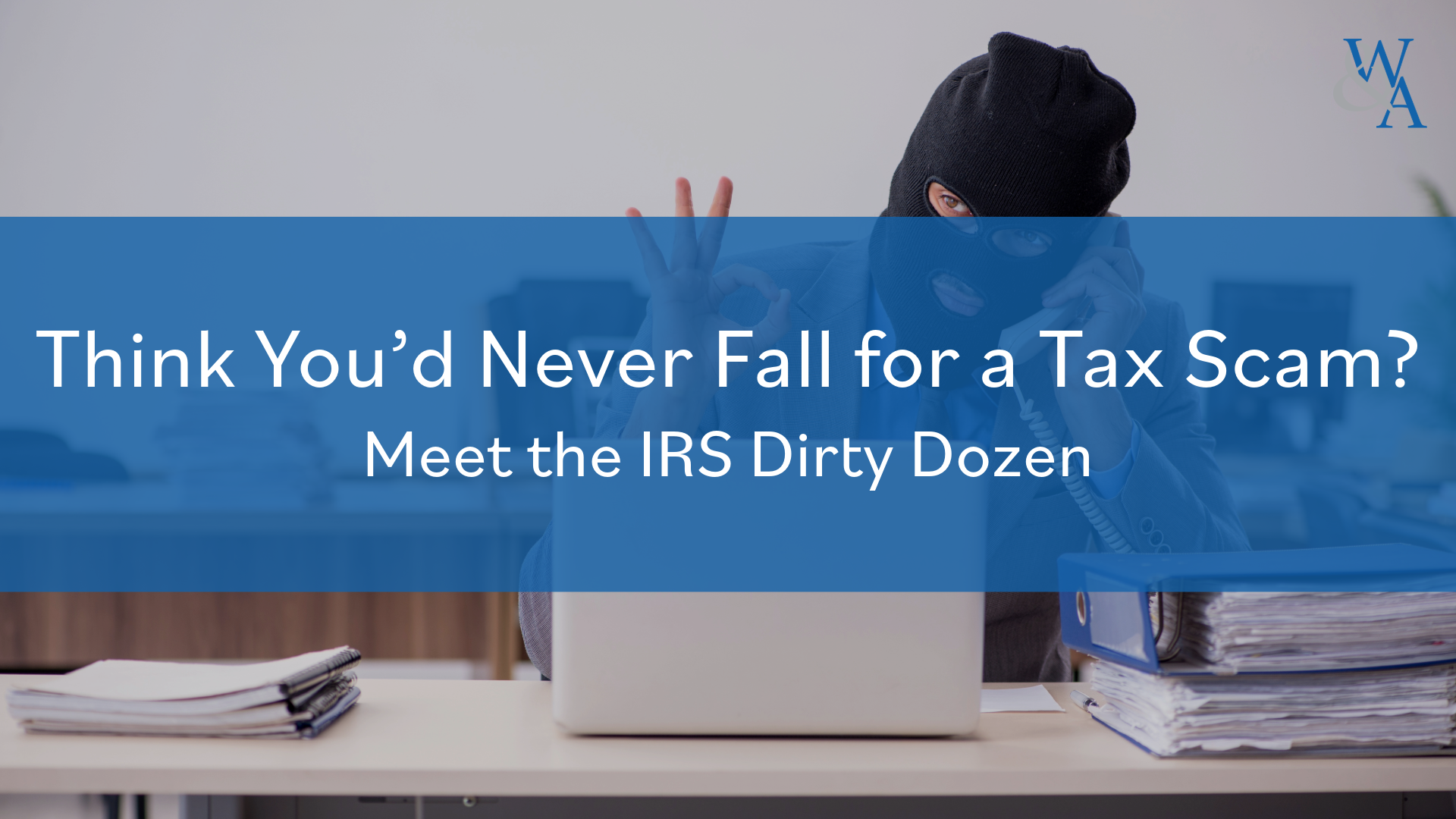
Think You’d Never Fall for a Tax Scam? Meet the IRS Dirty Dozen
Tax season is winding down, but that doesn’t mean we can let our guard down. Scammers are always on the prowl, especially during this time of year, looking to dupe unsuspecting taxpayers. To help you stay vigilant, the IRS releases an annual “Dirty Dozen” list, highlighting the top tax scams to watch out for. Let’s break them down in a way that’s easy to understand and, dare we say, a bit entertaining.
Whether you’ve already filed your return or are getting ready to, it’s still incredibly important to know the red flags. These scams happen year-round. Staying informed now can help protect your identity, your business, and your finances well beyond tax day.
1. Phishing and Smishing: The Digital Wolves
Imagine receiving an email or text that looks like it’s from the IRS, claiming you owe money or are due a refund. These are classic phishing (email) and smishing (text) scams. Scammers lure you into clicking malicious links or sharing personal information. Remember, the IRS won’t initiate contact with you via email or text about a bill or refund. Always be skeptical of unsolicited messages.
2. Bad Social Media Advice: Viral Tax Tips Gone Wrong
Scrolling through social media, you might come across tax advice that promises huge refunds or loopholes. While it might sound tempting, following unverified tips can lead to serious trouble, including audits and penalties. Always consult with a trusted tax professional before making decisions based on social media posts.
3. Online Account Scams: Faux Helpers Offering a Hand
Setting up your IRS online account is a straightforward process, but scammers might offer to “help” you, only to steal your personal information. Protect your data by setting up your account yourself through the official IRS website or seeking assistance from reputable sources.
4. Fake Charities: Wolves in Philanthropist’s Clothing
In times of crisis, many of us feel compelled to donate to charitable causes. Unfortunately, scammers set up fake charities to exploit this generosity. Before donating, verify the charity’s legitimacy through tools like the IRS’s Tax Exempt Organization Search.
5. False Fuel Tax Credit Claims: Credits That Don’t Apply
The Fuel Tax Credit is designed for off-highway business and farming use. Some unscrupulous preparers might suggest you qualify for this credit when you don’t, leading to inflated refunds and potential penalties. Be wary of anyone promising credits that seem too good to be true.
6. Misuse of Sick and Family Leave Credits: Pandemic-Era Benefits Misapplied
During the pandemic, certain credits were available for self-employed individuals. However, these don’t apply to income earned as an employee. Claiming them incorrectly can result in owing back taxes and interest. Ensure you’re eligible before claiming any credits.
7. Bogus Self-Employment Tax Credit: The Non-Existent Windfall
Circulating on social media is misinformation about a so-called “Self-Employment Tax Credit” promising large payouts. In reality, no such broad credit exists. Filing for nonexistent credits can lead to audits and penalties. Always verify tax credit information with official sources.
8. Improper Household Employment Taxes: Imaginary Employees
Some taxpayers fabricate household employees to claim refunds based on false sick and family medical leave wages. This fraudulent activity is illegal and can result in severe consequences. Honesty is the best policy when it comes to tax filings.
9. The Overstated Withholding Scam: Inflated Income and Withholding
This scam involves fabricating income and withholding amounts on tax forms to secure a larger refund. The IRS verifies all income and withholding, so falsifying this information will likely lead to your refund being held and further investigation.
10. Misleading Offers in Compromise: Too Good to Be True Settlements
Offers in Compromise (OIC) allow taxpayers to settle debts for less than the full amount owed. However, some companies mislead taxpayers about their eligibility, charging hefty fees for services they can’t deliver. Use the IRS’s OIC Pre-Qualifier tool to check your eligibility before seeking professional assistance.
11. Ghost Tax Return Preparers: The Invisible Menace
“Ghost” preparers refuse to sign tax returns they prepare, leaving you responsible for any errors or fraud. They might promise big refunds and charge fees based on the refund amount. Always ensure your tax preparer signs your return and has a valid Preparer Tax Identification Number (PTIN). 
12. Spear Phishing Attacks: Personalized Digital Deception
Scammers are getting sophisticated, targeting tax professionals and taxpayers with personalized emails that appear legitimate. These “spear phishing” attacks aim to steal sensitive information. Always verify the identity of anyone requesting personal data and be cautious with email attachments and links.
Staying Ahead of Tax Scams in 2025
As IRS scams continue to evolve, staying informed is your first line of defense. While many of the Dirty Dozen scams are updated versions of schemes from years past, scammers are becoming more sophisticated in how they target both individuals and business owners.
Here are a few quick ways to protect yourself:
- Be cautious with unsolicited communications.
- Verify tax preparers and charitable organizations.
- Never share personal info via unsecured channels.
- When in doubt, check directly with the IRS or a licensed tax professional.
How Watson & Associates Helps Protect You from IRS Scams
At Watson & Associates, we believe that protecting your financial well-being goes beyond just preparing your return. We stay on top of the latest IRS updates and fraud trends to keep our clients safe and informed year-round.
If you’re unsure about a message you’ve received, concerned about a tax preparer’s credentials, or just want an extra set of eyes on your tax strategy, we’re here for you. Our team combines deep tax knowledge with a personal touch, so you always have someone you trust looking out for your best interests.